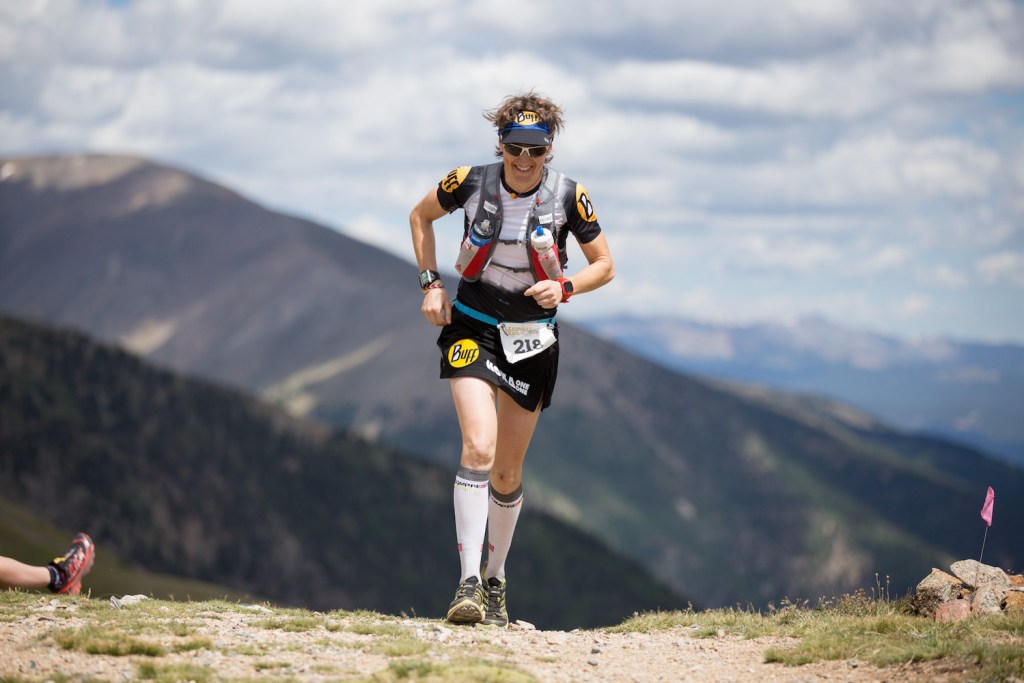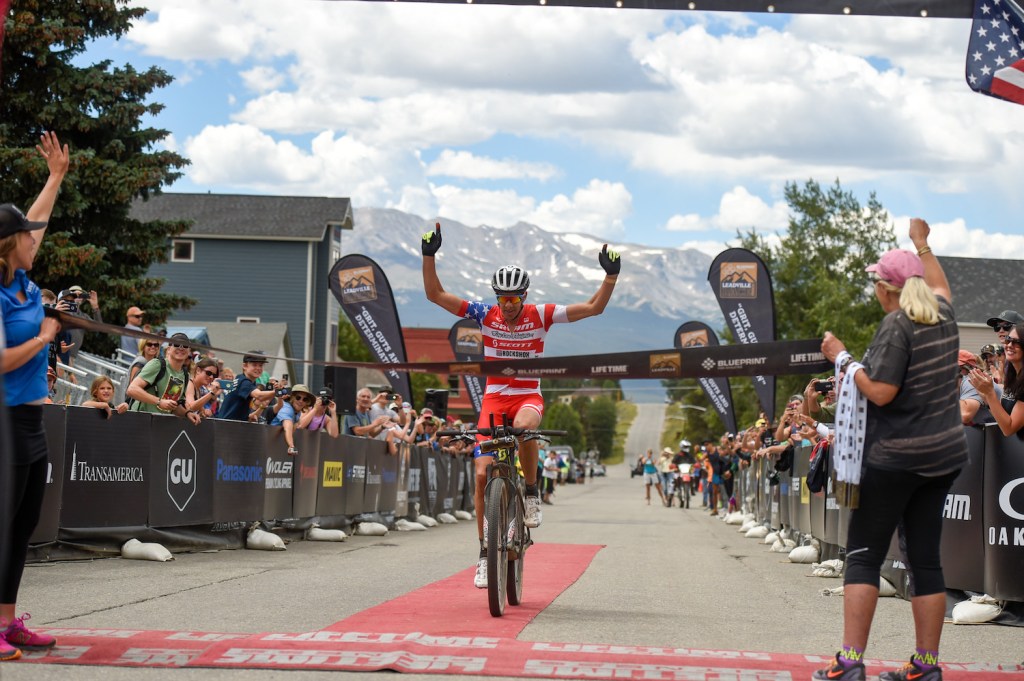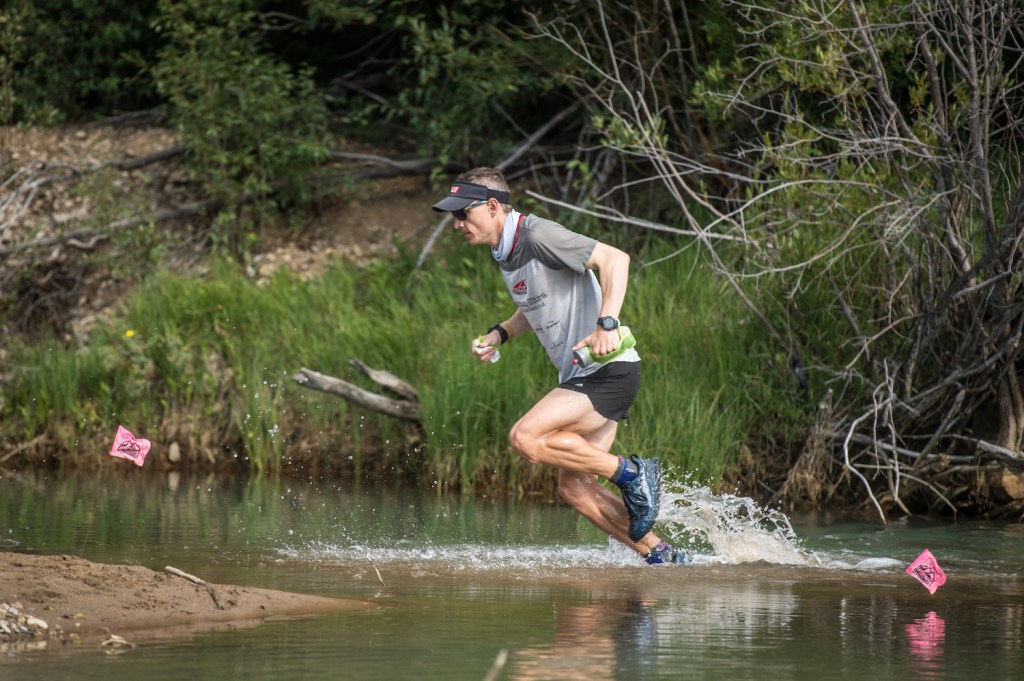You may not be ready to sign up for a 100-mile trail run or mountain bike race. That’s OK. But you can still learn a thing or two from the athletes who do those types of endurance events at the most elite level. (For example: Try dreaming of ice cream whenever a ride gets tough. That’s what mountain bike racer Larissa Connors does.)
This month, top mountain bikers and ultrarunners head to the high-altitude town of Leadville, Colorado, to compete in the Leadville Trail 100 MTB, taking place August 10, and the Leadville Trail 100 Run, taking place August 17. Eight former Leadville champions gave us the scoop on what drives them, how they push through when they feel like quitting and their advice for first-time racers.

Emma Roca, 2014 winner of the Leadville Trail 100 Run, knows each race comes with ups and downs. (Photo Credit: Life Time)
When training gets hard, I find my motivation in…
Devon Yanko, 2017 winner of the Leadville Trail 100 Run: “Looking at my fundamental value system for why I pursue the goals I do. The more personal and deeply connected I feel to the process, the easier it is to get fired up. Also, I like to remember that there will always be moments in races and training when things get hard, when we want to quit, but just because the negative thought comes up doesn’t mean we need to indulge it.”
Rob Krar, two-time winner of Leadville Trail 100 Run: “Knowing in the core of my heart that I’ll be a better person for the rest of the day if I get out the door and get it done.”
Emma Roca, 2014 winner of the Leadville Trail 100 Run: “Spending time with my dog [while training] and sometimes listening to good music.”
Larissa Connors, two-time winner of Leadville Trail 100 MTB: “Thinking about what my competition is doing at that moment. If they are sucking it up and getting the intervals done and I’m getting soft, I won’t stand a chance, so I think about the women I will race with and imagine them nailing a crazy hard workout, then I get my butt out the door to get it done.”
Annika Langvad, 2015 winner and course record setter of the Leadville Trail 100 MTB: “Knowing how great and satisfied I’ll feel when I spend the rest of the day on the couch.”
Todd Wells, three-time winner of the Leadville Trail 100 MTB: “Most professional cyclists don’t lack motivation to ride, no matter how bad it gets. The hard part for me is never the training, it’s the time away from my family and the diet. When you’re training or racing in some far-off land and not getting the results you hope for, it can be hard to keep the morale high. It’s easy to get homesick, eat poorly and eat too much. I always found surrounding myself with positive people and making as many mini trips home as possible worked best for me. It’s knowing that putting in the work now will get you the results you’re hoping for on race day.”

A victorious finish line for three-time winner of the Leadville Trail 100 MTB Todd Wells. (Photo Credit: Life Time)
The most important thing to remember about nutrition and hydration while training and racing is…
Krar: “Fuel early and fuel often, even at 4:30am when it’s cold and dark and the last thing you want to do is squeeze a GU down your throat.”
Yanko: “Altitude is a huge stress on the body and demands more energy and hydration than at sea level, so having your nutrition dialed and preferably practiced at altitude is key.”
Connors: “I carry a hydration pack even though I’m a pro with people handing me bottles because it helps me drink during the hectic first two hours to stay ahead of my hydration needs.”
Wells: “Nutrition is probably the thing that does most competitors in. The elevation, dry air and time on the bike can wreak havoc on the stomach. The thing I hear most from people who miss their goals is [that their issues were] stomach and nutrition related. Having a tried-and-true nutrition plan is second only to putting in the physical work required to achieve your goal.”
When things begin to look bleak on race day, I push through by…
Yanko: “Remembering that there will always be highs and lows and that one bad mile (or 20) doesn’t equal a bad race. Things will always get better (and then worse and then better). Just try and remain focused on the next goal, whether that is the next aid station or the finish line.”
Ian Sharman, two-time winner of the Leadville Trail 100: “Reminding myself that the tough parts of the race are what it’s all about and what will mean the most to overcome. Anyone can run well when they feel good, but success comes from doing that through the hardest sections.”
Krar: “The fact that I choose to be here, that it’s supposed to be hard and that I can work through the low points and still have the race of my life.”
Roca: “Knowing that after a low moment there is a high one later.”
Langvad: “Eating anything with a chocolate taste.”
Connors: “Thinking about ice cream. This is 100 percent true of almost every 100-mile race I’ve done.”
Sally Bigham, three-time winner and former record setter of Leadville Trail 100 MTB: “Knowing that I don’t want to miss the goose bumps and sheer thrill of turning the last corner, cresting the hill and crossing the finish line.”
Wells: “Knowing everyone is suffering and anything can happen. In such a long race not only are mechanical problems a real possibility, but people crack all the time. One year when I won, Kristian Hynek had dropped me so badly on Columbine [an infamous climb on the course], he was minutes ahead of me at Powerline [another well-known stretch of trail]. He blew up, I caught him on the descent and wound up winning the race. You have to keep pushing because you never know what’s going to happen.”

Two-time Leadville champion Ian Sharman knows that a race is won through the toughest sections. (Photo Credit: Life Time)
My advice for someone attempting their first ultramarathon or long mountain bike race…
Yanko: “Go out there with the intent to learn. You’ve never done this before, enjoy the beginner’s mindset and being able to learn from what comes up during the race. I think the number one goal of a first ultra should always be to finish.”
Sharman: “Use power-hiking as a tactic and choice, rather than only resorting to it when you can no longer run.”
Krar: “Focus on the journey and not on the result. It’s the 99 percent that nobody ever sees that is most meaningful when it’s all said and done.”
Roca: “Be progressive and have the experience of shorter races to face problems that a bigger one can have.”
Connors: “Have fun. Even if you are the most competitive pro out there, I don’t think it’s worth it to toe the line if you aren’t having the time of your life, so enjoy every minute of it. A hundred miles may seem long, but it’s going to be over before you know it and if you don’t savor every pedal stroke, why did you stress so much about the training and everything leading up to the race? Also enjoy the process, the training, the registration, the nerves at the start—enjoy it all. It’s all such a cool experience we are lucky to share.”
Bigham: “Enjoy the training—you must make it fun—and come race day, soak up the atmosphere of the race, enjoy the crowds and their support and smile. Remember where you are and how lucky you are to be there.”
Wells: “If possible, try to ride the trails in the area before the race so you are somewhat familiar with the terrain. Make sure your bike is in good working order the week leading up to the event. Make a checklist of things you don’t want to forget and make sure you have your bike, shoes and helmet when you head off to the race. Everything else you can make do without. If you can find a friend to do the race with that will make it even more fun and less stressful. It’s always better to have someone to share a new experience with.”
